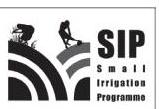
The expected impact of the SIP is to increase agricultural income of rural poor especially the disadvantaged groups in the programme districts. The programme will contribute to Nepal's goal of increasing agriculture GDP per capita and the area under irrigation. The program outcome is; Small farmers especially from disadvantaged groups increase their productivity by managing and maintaining farmers managed irrigation systems (FMIS).Disadvantaged farmers in target communities will have more reliable and increased availability of irrigation water that will allow them to convert rain fed and suboptimal irrigated areas under command of the irrigation systems to fully irrigated areas. Without access to water and control over it, smallholders do not have a basis for commercial agricultural production. The risk of losing their crop due to erratic rainfall or inadequate irrigation water deters the smallholder from investing in high-value crop production. The ability to control water at critical stages of crop production is the single most important factor for enabling smallholders to enter commercial agricultural production. With efficient utilization of irrigation water, crop yields and cropping intensity are expected to increase by respectively 30% and 30% in the projects within five years of construction.